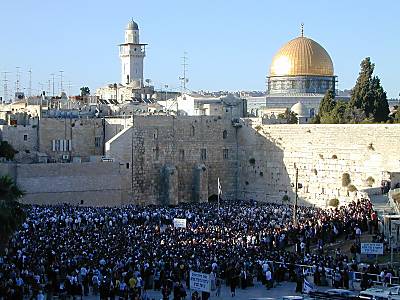UPDATES
Temple Denial
September 2, 2011 | Sharyn Mittelman

The phenomenon of ‘Temple Denial’ is a campaign led by Palestinian political leaders, religious figures, academics and journalists to delegitimise the Jewish historical connection with the area of Temple Mount and Western Wall in Jerusalem – which according to Jewish tradition is Judaism’s most holy sites.
It also attempts to increase the importance of Jerusalem, the Temple Mount and even the Western Wall in Islam as part of the effort to make Jerusalem a Muslim city under Arab governance – and to deny the need for any Palestinian compromise on Jerusalem with Jewish religious and national rights. This trend even includes the removal of archaeological material from the Temple Mount without archaeological supervision (see blog post by Allon Lee).
David Barnett writes that ‘Temple Denial’ is:
“the belief that no Jewish Temple ever existed in Jerusalem. This claim, despite being counter to Islamic tradition, became internalised within Palestinian academic, religious, and political circles following the 1967 Six-Day War. Since the 2000 Camp David Summit, during which Yasir Arafat asserted that the Jewish Temple never existed in Jerusalem, ‘Temple Denial’ has spread with increased virulence in an attempt to deny both Jewish authority and access to the Temple Mount and Western Wall.”
After claiming at Camp David that there was never any Jewish temple in Jerusalem but that it was actually located in Nablus, Arafat later changed his mind – stating that the Jewish temple, mentioned in both the bible and Koran, was really in Yemen. The influence of Temple Denial continues in the current Palestinian leadership with Palestinian Authority President Machmoud Abbas stating that : “[Jews] claim that 2000 years ago they had a holy place there. I challenge the assertion.”
Dore Gold, President of the Jerusalem Centre for Public Affairs in his book The Fight for Jerusalem: Radical Islam, the West and the Future of the Holy City maintains that in the wake of Arafat’s remark Temple denial “spread across the Middle East like wildfire,” and even “subtly slipped into the writing of Middle-East based western reporters.”
The influence of temple denial on journalists as also been criticised by in 2009 by Professor James Davila of St Mary’s College, St Andrews, who condemned the increasing practice among journalists of writing about two legitimate “competing narratives” with the Jewish Temple’s existence in Jerusalem only a Jewish ‘claim’ or ‘tradition.’ According to Professor Davila:
“reporters need to get it straight that there is no debate among specialists in specialist literature about the existence of the Iron Age II Judean Temple and the Second and Herodian Temples in Jerusalem on the Temple Mount platform. Again, narratives to the contrary are propaganda, not scholarship.”
David Barnett writes “temple denial is historical revisionism that runs counter to classical Islamic tradition and archaeological evidence”. The phenomena of Temple Denial is relatively new because according to most Islamic scholars, the Koran affirms Judaism’s special connection to the Temple Mount.
Imam Abdul Hadi Palazzi, leader of Italian Muslim Assembly and a co-founder and a co-chairman of the Islam-Israel Fellowship, has stated: “The most authoritative Islamic sources affirm the Temples,” he also said that Jerusalem is sacred to Muslims because of its prior holiness to Jews and its standing as home to the biblical prophets and kings David and Solomon, all of whom he says are sacred figures also in Islam. Palazzi claims that the Koran “expressly recognizes that Jerusalem plays the same role for Jews that Mecca has for Muslims.”
But the campaign of Temple Denial not only flies in the face of the archaeological and historical evidence and Islamic traditions, it is also a politically motivated attempt to deny and undo an element central to Judaism and Jewish identity for over 2000 years. As Barnett writes:
“Jewish connection to Jerusalem and the Temple Mount originates in the biblical narrative, as it is said to be the location of the binding of Isaac. The Talmud, Judaism’s supreme canonical text, says that the foundation stone on the Temple Mount is the location from which the world was created. In Samuel II 24:18-25, King David bought the bedrock for the Temple from Araunah the Jebusite. Subsequently, Solomon, David’s son, used the bedrock to build the First Temple. Solomon’s Temple was eventually destroyed by Nebuchadnezzar II of Babylon in 586 BCE.
Today, Jews follow a number of different customs in remembrance of their fallen Temple. When Jews pray, they pray toward Jerusalem. Within the daily liturgy, there are numerous calls for the rebuilding of Jerusalem and the Temple. During the week, after meals, Jews recite a grace, which includes the recitation of Psalm 137 (“If I forget thee, O Jerusalem…”). At the end of a wedding ceremony, the groom breaks a glass, which signifies the Jewish people’s continued mourning over the Temple’s destruction. In addition, many have the custom of leaving a wall in their home unfinished in remembrance of the destruction.”
Demanding that Jews renounce any claim to the Western Wall or Jerusalem is equivalent of demanding Muslims give up Mecca, and all the traditions that surround it.
It is also worth remembering that it has been Israel that ensured respect for, and access to, holy sites of all faiths. When Jordan ruled Jerusalem’s Old City between 1948 and 1967, Jews were barred from sacred sites, and the famous Hurva and Ramban synagogues were destroyed. But since capturing eastern Jerusalem in the 1967 Six Day War, Israel has ensured Jews, Christians and Muslims free access to their holy places.
Any Israeli-Palestinian peace agreement will require arrangements for Jerusalem that respect the religious and political rights and tradition of Jews, Muslims and Christians. By claiming Jewish rights are bogus and need not be part of the equation, Temple Denial is another form of Palestinian incitement which makes achieving peace much more difficult. And a particularly ugly and bigoted one.
For a deeper look into the history and implications of temple denial click here.
Sharyn Mittelman
Tags: Antisemitism





